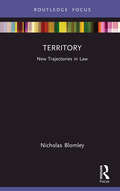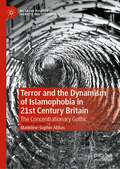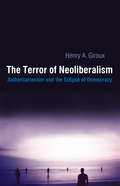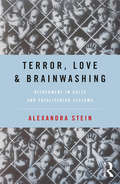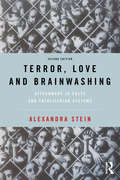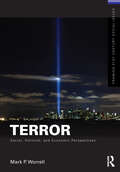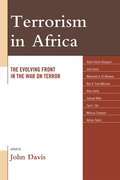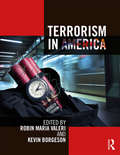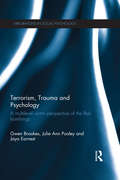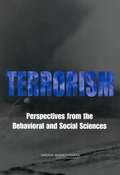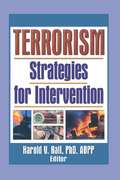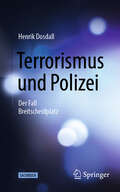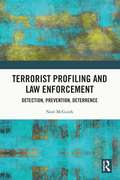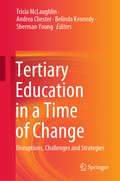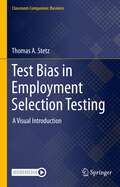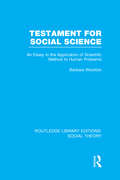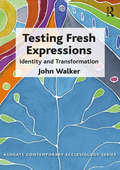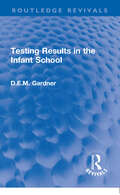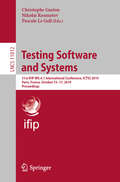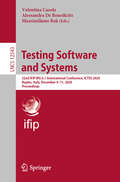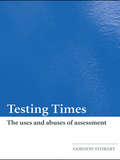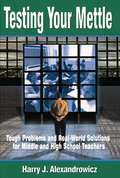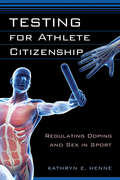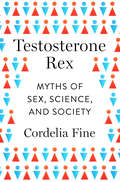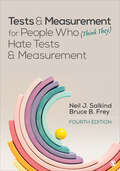- Table View
- List View
Territory: New Trajectories in Law (New Trajectories in Law)
by Nicholas BlomleyThis book introduces readers to the concept of territory as it applies to law while demonstrating the particular work that territory does in organizing property relations. Territories can be found in all societies and at all scales, although they take different forms. The concern here is on the use of territories in organizing legal relations. Law, as a form of power, often works through a variety of territorial strategies, serving multiple legal functions, such as attempts at creating forms of desired behaviour. Landed property, in Western society, is often highly territorial, reliant on sharply policed borders and spatial exclusion. But rather than thinking of territory as obvious and given or as a natural phenomenon, this book focuses particularly on its relation to property to argue that territory is both a social product, and a specific technology that organizes social relations. That is: territory is not simply an outcome of property relations but a strategic means by which such relations are communicated, imagined, legitimized, enforced, naturalized and contested. Accessible to students, this book will be of interest to those working in the areas of sociolegal studies, geography, urban studies, and politics.
Terror and the Dynamism of Islamophobia in 21st Century Britain: The Concentrationary Gothic (Palgrave Politics of Identity and Citizenship Series)
by Madeline-Sophie AbbasThis book provides powerful insights into the dynamics, nature, and experiences of the terrors of counter-terrorism measures in the UK. Abbas links her analysis to wider concerns of nation construction and belonging; racial profiling and policing; the state of exception and pre-emptive counter-terrorism measures; community-based counter-terrorism measures; and restrictions to political engagement, freedom of speech and hate speech. What makes this work distinct is its advancement of an original framework - the Concentrationary Gothic - to delineate the racialised mechanisms of terror involved in the governance of Muslim populations in the ‘war on terror’ context. The book illuminates the various ways in which Muslims in Britain experience terror through racialised surveillance and policing strategies operating at state, group (inter- and intra-), and individual levels in diverse contexts such as the street, workplace, public transport and the home. Abbas situates these experiences within wider racial politics and theory, drawing connections to anti-Semitism, anti-blackness, anti-Irishness and whiteness, to provide a complex mapping of the ways in which racial terror has operated in both historical and contemporary contexts of colonialism, slavery, and the camp, and offering a unique point of analysis through the use of Gothic tropes of haunting, monstrosity and abjection. This vital work will be of interest to students and scholars across sociology, criminology, anthropology, terrorism studies, Islamic studies, and critical Muslim studies, researching race and racialisation, security, immigration, nationhood and citizenship.
Terror of Neoliberalism: Authoritarianism and the Eclipse of Democracy (Cultural Politics And The Promise Of Democracy Ser.)
by Henry A. GirouxThis book argues that neoliberalism is not simply an economic theory but also a set of values, ideologies, and practices that works more like a cultural field that is not only refiguring political and economic power, but eliminating the very categories of the social and political as essential elements of democratic life. Neoliberalism has become the most dangerous ideology of our time. Collapsing the link between corporate power and the state, neoliberalism is putting into place the conditions for a new kind of authoritarianism in which large sections of the population are increasingly denied the symbolic and economic capital necessary for engaged citizenship. Moreover, as corporate power gains a stranglehold on the media, the educational conditions necessary for a democracy are undermined as politics is reduced to a spectacle, essentially both depoliticizing politics and privatizing culture. This series addresses the relationship among culture, power, politics, and democratic struggles. Focusing on how culture offers opportunities that may expand and deepen the prospects for an inclusive democracy, it draws from struggles over the media, youth, political economy, workers, race, feminism, and more, highlighting how each offers a site of both resistance and transformation.
Terror, Love and Brainwashing: Attachment in Cults and Totalitarian Systems
by Alexandra SteinWritten by a cult survivor and renowned expert on cults and totalitarianism, Terror, Love and Brainwashing draws on the author’s 25 years of study and research to explain how almost anyone, given the right set of circumstances, can be radically manipulated to engage in otherwise incomprehensible and often dangerous acts. Illustrated with compelling stories from a range of cults and totalitarian systems, from religious to political to commercial, the book defines and analyses the common and identifiable traits that underlie almost all these groups. It focuses on how charismatic, authoritarian leaders control their followers’ attachment relationships via manipulative social structures and ideologies so that, emotionally and cognitively isolated, they become unable to act in their own survival interests. Using the evolutionary theory of attachment to demonstrate the psychological impact of these environments, and incorporating the latest neuroscientific findings, Stein illustrates how the combined dynamic of terror and ‘love’ works to break down people’s ability to think and behave rationally. From small local cults to global players like ISIS and North Korea, the impact of these movements is widespread and growing. This important book offers clarity and a unique perspective on the dynamics of these systems of control, and concludes with guidance to foster greater awareness and prevention. It will be essential reading for mental health professionals in the field, as well as policy makers, legal professionals, cult survivors, and their families, as well as anyone with an interest in these disturbing groups. Students of social and developmental psychology will also find it fascinating.
Terror, Love and Brainwashing: Attachment in Cults and Totalitarian Systems
by Alexandra SteinThis book explains how people can be radically manipulated by extreme groups and leaders to engage in incomprehensible and often dangerous acts through psychologically isolating situations of extreme social influence. These methods are used in totalitarian states, terrorist groups and cults, as well as in controlling personal relationships. Illustrated with compelling stories from a range of cults and totalitarian systems, Stein's book defines and analyses the common identifiable traits that underlie these groups, emphasizing the importance of maintaining open yet supportive personal networks. Using original attachment theory-based research this book highlights the dangers of closed, isolating relationships and the closed belief systems that justify them, and demonstrates the psychological impact of these environments, ending with evidence-based recommendations to support an educational approach to awareness and prevention. Featuring a foreword by John Horgan, the new edition has been fully updated to include recent work on political extremism and radicalization and totalitarian systems, as well as the recent highly publicized NXIVM case. Terror, Love and Brainwashing, second edition is essential reading for professionals, policy makers, legal professionals, educators and cult survivors and their families themselves.
Terror: Social, Political, and Economic Perspectives (Framing 21st Century Social Issues)
by Mark WorrellAbout the Series The goal of this new, unique Series is to offer readable, teachable "thinking frames" on today’s social problems and social issues by leading scholars, all in short 60-page-or-shorter formats, and available for view on http://routledge.customgateway.com/routledge-social-issues.html. For instructors teaching a wide range of courses in the social sciences, the Routledge Social Issues Collection now offers the best of both worlds: originally written short texts that provide "overviews" to important social issues as well as teachable excerpts from larger works previously published by Routledge and other presses. About the Book In this short text, Worrell shines a unique, unorthodox light on ‘Terror’ from the standpoint of critical social theory. He explains how the social, political and economic effects of terrorism fit into the dynamics and structures of the modern world as a whole.
Terrorism in Africa: The Evolving Front in the War on Terror
by John DavisTerrorism in Africa: The Evolving Front in the War on Terrorism, represents a research endeavor aimed at increasing scholarly discourse on the ever-expanding threat of terrorism and terrorist-related violence in the region. It's analysis of the sub-national and transnational terrorists groups that have made Africa the second most violent region in the world. <P><P>This analysis of the states, terrorist groups, and critical issues that have increased the specter of terrorism in Africa. (1) the diversity of the terrorist threat among states in the region, (2) the regional dynamics and the local response to terrorism, and (3) regional solutions to the threat of terrorism in Africa.
Terrorism in America
by Robin Maria Valeri Kevin Borgeson<p>Offering a fresh perspective on the changing face of terror attacks, Terrorism in America focuses on domestic groups, examining the beliefs, actions, and impacts of American-based terrorists and terror organizations. Editors Robin Valeri and Kevin Borgeson and their contributors draw on theories from criminology, psychology, and sociology to explore the ideologies of right-wing, left-wing, and extremist religious groups—how and why they convert followers, recruit financially, and take extreme action against others. No competing text offers such in-depth and nuanced coverage of the radical ideologies behind these attacks, or the ensuing fear domestic terrorism creates, as well as the strategies to combat violent extremism. <p>A core text for domestic terrorism courses and an excellent supplement for any counterterrorism or homeland security course, Terrorism in America brings its singular focus to the growth and evolution of terrorism in the United States. Interviews, case studies from the field, and chapter themes make this a highly readable text for criminal justice, psychology, sociology, and homeland security students, professors, or practitioners.</p>
Terrorism, Trauma and Psychology: A multilevel victim perspective of the Bali bombings (Explorations in Social Psychology)
by Gwen Brookes Julie Ann Pooley Jaya EarnestThis book provides a comprehensive insight into the multilayered effects experienced by directly affected victims and their indirectly affected family members following terrorist incidents and other world disasters. Chapters draw primarily on interviews with fifty victims of the Bali bombings, but also consider terrorist incidents including the London and Boston bombings, and disasters such as the Boxing Day tsunami and the Fukusima nuclear disaster. The book provides a detailed exploration of experiences and perceptions of those involved in the traumatic events, as well as their families, emergency response teams and community volunteers. Chapters discuss community responses to major incidents, appropriate non-medical models of intervention and vulnerable groups that may require special attention. The findings and analysis presented contribute to our understanding of the multilayered effects of terrorism on victims of all levels, and the importance of a planned and informed response, which includes the local community and its wealth of pre-existing resources. Terrorism, Trauma and Psychology: A multilevel victim perspective of the Bali bombing will be key reading for researchers and academics in the fields of social and clinical psychology, as well as scholars of victimology and terrorism studies.
Terrorism: Perspectives from the Behavioral and Social Sciences
by Neil J. Smelser Faith MitchellThe events and aftermath of September 11, 2001, profoundly changed the course of history of the nation. They also brought the phenomenon known as terrorism to the forefront of the nation's consciousness. As it became thus focused, the limits of scientific understanding of terrorism and the capacity to develop policies to deal with it became even more evident. The objective of this report is to bring behavioral and social science perspectives to bear on the nature, determinants, and domestic responses to contemporary terrorism as a way of making theoretical and practical knowledge more adequate to the task. It also identifies areas of research priorities for the behavioral and social sciences.
Terrorism: Strategies for Intervention
by Harold Hall VAn essential resource for anyone working against terrorism in any form it may take! Written for threat assessment professionals in the post-9/11 era, this timely book will help you understand the motivation to commit acts of terror, the thinking patterns common to many terrorists, the psychology of Muslim fundamentalists, methods for predicting the likelihood of chemical/biological attacks, and a great deal more. You&’ll learn about hostage/barricade situations and the role of the crisis negotiator, including victim/perpetrator psychology and factors that indicate progress is being made in a crisis negotiation and factors that imply imminent lethality. After reading Terrorism: Strategies for Intervention, you&’ll have a better understanding of: biological, social, and psychological constructs that are important to understanding group violence the role of emotions in violence the history of chemical/biological weapons use from 1978 to the present, and methods of predicting the likelihood and origins of such attacks the importance of concurrent sequences in relation to chemical/biological attacks hostage/barricade situations, the makeup of crisis negotiation teams, and the role of the crisis negotiator hostage incident databases-where to find them, what they contain, and how they can be used effectively six different types of hostage takers and what strategies have the best chance of bringing each type&’s crises to an end factors that indicate progress is being made in a crisis negotiation and factors that imply imminent lethality ethical concerns for forensic consultants when dealing with the issues surrounding terrorism Here is a sample of what you&’ll find in this informative and well-referenced book: "Terrorism as Group Violence" illustrates the complexity of terrorism and the need to consider the interplay of biological, social, and psychological influences on terrorist behavior. This chapter identifies the constructs and data generated by theories of violence that are relevant to terrorism. Next, profiles of terrorists&’ motivations are scrutinized, followed by a probing of the specific patterns of thinking salient to their motivations. Finally, approaches to solving the terrorist problem are framed. Five handy tables make important points easy to access and understand. "Chemical and Biological Violence: Predictive Patterns in State and Terrorist Behavior" is essential reading for any serious evaluator of chemical and biological weapons. This chapter uses the Lethal Violence Sequence as a means to help predict chemical/biological weapons use by religious and ethno-nationalist terrorist groups. It includes case vignettes, data categories that can help make predictions more accurate, and a discussion of solutions for use by individuals, law enforcement and federal anti-terrorist agencies, as well as manufacturers and other industry entities, plus a consideration of government and international efforts. "Negotiating Crises: The Evolution of Hostage/Barricade Crisis Negotiations" examines multiple ways by which a crisis incident can be classified, analyzes the results of hostage incident databases, discusses negotiation techniques, and explores the impact of captivity on the victim. The author reveals important characteristics of hostage/barricade situations that can be vital to the success of the evaluator/negotiator. Six informative tables in this section make statistics and procedures easy to understand. "Ethical Concerns in Forensic Consultation Regarding National Safety and Security" provides an essential overview of the ethical challenges that mental health professionals and behavioral scientists face when they consult on matters of national security and safety. This chapter delivers useful guidance for professionals who
Terrorismus und Polizei: Der Fall Breitscheidplatz
by Henrik DosdallDer schwerste islamistische Anschlag in der Geschichte der Bundesrepublik – der Anschlag auf den Berliner Breitscheidplatz – hat eine Besonderheit: verschiedene Polizeien ermittelten über Monate gegen den späteren Täter, stellten ihre Ermittlungen dann aber Monate vor dem Anschlag ein. Wie kam es zu dieser Einstellung? Und wie ermitteln Polizeien überhaupt im Bereich Terrorismus? Handelt es sich um einen eklatanten Fall von Behördenversagen? Oder waren andere Gründe ausschlaggebend für die Einstellung? Was verrät uns der Fall über die Herausforderungen, die sogenannte Einzeltäter*innen für die Polizei? Das vorliegende Buch nimmt diese Fragen aus einer informierten soziologischen Perspektive auf.
Terrorist Profiling and Law Enforcement: Detection, Prevention, Deterrence
by Noel McGuirkThis book analyses the usefulness of terrorist profiling utilised by law enforcement officers as a pre-emptive means to assist them in the detection, prevention and deterrence of terrorism and/or its preparatory activities. It explores two main themes arising from the phenomenon of terrorist profiling: the lawfulness of terrorist profiling and the utility of profiling. These two themes are explored in three separate parts. Firstly, the book begins by drawing upon human rights concerns arising from the use of terrorist profiling by law enforcement officers. Secondly, an analytical framework capable of making determinations on the usefulness of terrorist profiling. This framework develops a profiling spectrum that ranges from formal and informal manifestations of terrorist profiling that forms the basis for evaluating its usefulness. Finally, the book presents an examination of various manifestations of terrorist profiling by separating the analysis of the ‘construction’ of profiles on the one hand, from their ‘application,’ on the other, so as to be able to identify and examine profiling’s usefulness as a technique to assist law enforcement officers make predictions about likely offender characteristics. This book ultimately concludes that terrorist profiling should only be conducted by undertaking a systematic assessment of the construction of profiles separate from the application of profiles whilst simultaneously taking into account fundamental human rights concerns with the practice of terrorist profiling. The work will be an essential resource for academics, law enforcement officers and lawyers in the disciplines of law, criminology, human rights, criminal justice and policing. As the book engages with terrorist profiling, it will also be of interest to those engaged in the psychology of terrorism.
Tertiary Education in a Time of Change: Disruptions, Challenges and Strategies
by Sherman Young Tricia McLaughlin Andrea Chester Belinda KennedyThis book shares exemplary teaching and learning practices from the tertiary sector, and addresses important issues concerning quality, scholarship and innovation in teaching and learning in tertiary settings. It takes on classic issues regarding curricula, technologies and assessment, but approaches them from novel perspectives and using a variety of methodological approaches. Its chapters explore innovative and cutting-edge ideas in tertiary education. Readers will be both challenged and inspired to investigate the ideas discussed further.
Test Bias in Employment Selection Testing: A Visual Introduction (Classroom Companion: Business)
by Thomas A. StetzThis book provides students with a concise introduction to test bias from a psychometric point-of-view without statistics. It uses easy to understand graphs to explain complex technical approaches to test bias giving readers a highly sought-after knowledge enabling them to be better consumers of tests.Studies performed by the Society for Human Resource Management (SHRM) consistently show that selection is a key competency for Human Resource (HR) professionals. Knowledge of test bias is a key component to effectively and legally performing this highly valued HR function. Unfortunately, test bias is rarely covered in HR classes or is presented in a highly technical manner geared to individuals with strong statistical and mathematical backgrounds. This book, requiring no previous statistical or mathematical knowledge, can be used as a supplemental textbook for any class that deals with selection, staffing, or measurement at the undergraduate or graduate level.
Testament for Social Science: An Essay in the Application of Scientific Method to Human Problems (Routledge Library Editions: Social Theory Ser.)
by Barbara WoottonThe contrast between man’s amazing ability to manipulate his world and his pitiful incompetence in managing his own affairs is now as commonplace as it is tragic. It is by rigorous devotion to scientific method that we have made our conquests over the material environment; it is obvious that this method is not normally applied to the field of relations of human beings, individual and collective. These are conducted in a quite different way, governed by a medley of primitive impulses set in a framework of a traditional morality that varies from place to place and age to age. In these matters science plays little part; yet more than a century has passed since Auguste Comte said that the rational reform of society must be brought about by the application of scientific method to social problems. It is, therefore, the first purpose of this essay to ask how far social problems might be tackled by the methods of science.
Testing Fresh Expressions: Identity and Transformation (Routledge Contemporary Ecclesiology)
by John WalkerTesting Fresh Expressions investigates whether fresh expressions of church really do what is claimed for them by the fresh expressions movement and, in particular, whether their unique approach helps to reverse trends of decline experienced by traditional churches. Part 1 examines those claims and untangles their sociological and theological assumptions. From a careful study of factors underlying attendance decline and growth, Part 2 argues that long-term decline can be resisted only if churches are better able to attract children, the non-churched or both. Part 3 tests the comparative ability of a group of growing parish churches and a group of fresh expressions to resist trends of decline and discovers some intriguing social dynamics common to both groups. Part 4 argues that fresh expressions do not fulfil the unique role often claimed for them but that they do have the capacity to help reinvigorate the whole church.
Testing Results in the Infant School (Routledge Revivals)
by D.E.M. GardnerFirst published in 1942, Testing Results in the Infant School describes an attempt to measure objectively the results of education in Infant schools where children are free to move and speak and play, as compared with schools of a more formal and traditional type. The book explains in detail the variety of tests used, the reasons behind them, and the children’s reactions to them. It concludes with an evaluation of the results and suggestions for their bearing on educational practice. It will appeal to those with an interest in the history, theory, and psychology of education.
Testing Software and Systems: 31st IFIP WG 6.1 International Conference, ICTSS 2019, Paris, France, October 15–17, 2019, Proceedings (Lecture Notes in Computer Science #11812)
by Nikolai Kosmatov Christophe Gaston Pascale Le GallThis book constitutes the refereed proceedings of the 31st IFIP WG 6.1 International Conference on Testing Software and Systems, ICTSS 2019, held in Paris, France, in October 2019. The 14 regular papers and 3 short papers presented were carefully reviewed and selected from 30 submissions. This year also included an additional industrial paper. ICTSS is a series of international conferences addressing the conceptual, theoretic, and practical problems of testing software systems, including communication protocols, services, distributed platforms, middleware, embedded and cyber-physical systems, and security infrastructures.
Testing Software and Systems: 32nd IFIP WG 6.1 International Conference, ICTSS 2020, Naples, Italy, December 9–11, 2020, Proceedings (Lecture Notes in Computer Science #12543)
by Valentina Casola Alessandra De Benedictis Massimiliano RakThis book constitutes the refereed proceedings of the 32nd IFIP WG 6.1 International Conference on Testing Software and Systems, ICTSS 2020, which was supposed to be held in Naples, Italy, in December 2020, but was held virtually due to the COVID-19 pandemic.The 17 regular papers and 4 short papers presented were carefully reviewed and selected from 43 submissions. ICTSS is a series of international conferences addressing the conceptual, theoretic, and practical problems of testing software systems, including communication protocols, services, distributed platforms, middleware, embedded and cyber-physical systems, and security infrastructures. The papers are organized in the topical sections named: model-based testing; security testing; testing methods and applications; testing methods and automation; and short contributions.
Testing Times: The Uses and Abuses of Assessment
by Gordon StobartAssessment dominates our lives but its good intentions often produce negative consequences. An example that is central to this book is how current forms of assessment encourage shallow ‘for-the-test’ learning. It is true to say that as the volume of assessment increases, confidence in what it represents is diminishing. This book seeks to reclaim assessment as a constructive activity which can encourage deeper learning. To do this the purpose, and fitness-for–purpose, of assessments have to be clear. Gordon Stobart critically examines five issues that currently have high-profile status: intelligence testing learning skills accountability the ‘diploma disease’ formative assessment Stobart explains that these form the basis for the argument that we must generate assessments which, in turn, encourage deep and lifelong learning. This book raises controversial questions about current uses of assessment and provides a framework for understanding them. It will be of great interest to teaching professionals involved in further study, and to academics and researchers in the field.
Testing Your Mettle: Tough Problems and Real-World Solutions for Middle and High School Teachers
by Harry J. AlexandrowiczIn this straightforward guide to what really happens in classrooms and hallways, veteran teacher and administrator Harry J. Alexandrowicz makes “reality training” available to both novice and experienced teachers. Alexandrowicz draws from his 28 years’ experience in schools to help prepare teachers to handle the inevitable legal, philosophical, and common-sense challenges they face every day. These challenges are presented as brief vignettes followed by four possible solutions with space for the educators to write their proposed actions, followed by sections on what actually happened, and why. The kinds of scenarios you will learn about include: A parent threatens you You witness students hazing another student You discover a gun in a student’s locker The school’s best athlete is failing your class You see inappropriate student behavior outside the classroom. This accessible “insider’s” view of the classroom will be an essential resource for teachers, administrators, and parents who want to gain valuable insights into how to handle what really happens in schools today.
Testing for Athlete Citizenship
by Kathryn E. HenneIncidents of doping in sports are common in news headlines, despite regulatory efforts. How did doping become a crisis? What does a doping violation actually entail? Who gets punished for breaking the rules of fair play? In Testing for Athlete Citizenship, Kathryn E. Henne, a former competitive athlete and an expert in the law and science of anti-doping regulations, examines the development of rules aimed at controlling performance enhancement in international sports. As international and celebrated figures, athletes are powerful symbols, yet few spectators realize that a global regulatory network is in place in an attempt to ensure ideals of fair play. The athletes caught and punished for doping are not always the ones using performance-enhancing drugs to cheat. In the case of female athletes, violations of fair play can stem from their inherent biological traits. Combining historical and ethnographic approaches, Testing for Athlete Citizenship offers a compelling account of the origins and expansion of anti-doping regulation and gender-verification rules. Drawing on research conducted in Australasia, Europe, and North America, Henne provides a detailed account of how race, gender, class, and postcolonial formations of power shape these ideas and regulatory practices. Testing for Athlete Citizenship makes a convincing case to rethink the power of regulation in sports and how it separates athletes as a distinct class of citizens subject to a unique set of rules because of their physical attributes and abilities.
Testosterone Rex: Myths of Sex, Science, and Society
by Cordelia Fine“Goodbye, beliefs in sex differences disguised as evolutionary facts. Welcome the dragon slayer: Cordelia Fine wittily but meticulously lays bare the irrational arguments that we use to justify gender politics.”—Uta Frith, emeritus professor of cognitive development, University College London Many people believe that, at its core, biological sex is a fundamental, diverging force in human development. According to this overly familiar story, differences between the sexes are shaped by past evolutionary pressures—women are more cautious and parenting-focused, while men seek status to attract more mates. In each succeeding generation, sex hormones and male and female brains are thought to continue to reinforce these unbreachable distinctions, making for entrenched inequalities in modern society. In Testosterone Rex, psychologist Cordelia Fine wittily explains why past and present sex roles are only serving suggestions for the future, revealing a much more dynamic situation through an entertaining and well-documented exploration of the latest research that draws on evolutionary science, psychology, neuroscience, endocrinology, and philosophy. She uses stories from daily life, scientific research, and common sense to break through the din of cultural assumptions. Testosterone, for instance, is not the potent hormonal essence of masculinity; the presumed, built-in preferences of each sex, from toys to financial risk taking, are turned on their heads. Moving beyond the old “nature versus nurture” debates, Testosterone Rex disproves ingrained myths and calls for a more equal society based on both sexes’ full, human potential.
Tests & Measurement for People Who (Think They) Hate Tests & Measurement
by Bruce B. Frey Neil J. SalkindWith a signature, conversational writing style and straightforward presentation, Neil J. Salkind’s best-selling Tests & Measurement for People Who (Think They) Hate Tests & Measurement guides readers through an overview of categories of tests, the design of tests, the use of tests, and some of the basic social, political, and legal issues that the process of testing involves. New co-author Bruce B. Frey has streamlined the table of contents for ease of use; added more content on validity and reliability throughout; more closely connected standardized tests to classroom instruction, adding more on classroom assessment; and added a chapter on surveys and scale development. An instructor website includes a test bank and PowerPoint slides.
